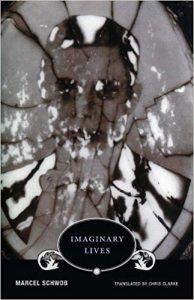Alex Andriesse at The Quarterly Conversation:
 Imaginary Lives (1896) was Schwob’s last book of fiction. He composed its twenty-two chapters—each one the story of a life, recounted in fewer than a dozen pages, with all of these lives arranged in chronological order—between 1893 and 1896. Early in its composition, at the age of twenty-six, Schwob suffered the first attack of a mysterious intestinal ailment whose painful effects and questionable treatments (ether, opium, morphine) would lead to his death at thirty-seven. Schwob’s physical condition to some extent shaped his fiction, and though all the chapters of Imaginary Lives culminate, naturally enough, in their subjects’ deaths, these deaths are often unnaturally violent. Lucretius the Poet is poisoned by his lover. Clodia the Licentious Matron is strangled, robbed, and dumped in the river Tiber. Gabriel Spenser the Actor is stabbed in the lung by Ben Jonson the playwright. And the three pirates of the book (Captain Kidd, Walter Kennedy, Stede Bonnet) are hanged and left to rot upon the rope. Imaginary Lives is, among other things, a study of human violence, proceeding from the sun-stroked era of ancient Greek gods and demigods to the soot-blackened nineteenth-century Edinburgh of the serial murderers Burke and Hare.
Imaginary Lives (1896) was Schwob’s last book of fiction. He composed its twenty-two chapters—each one the story of a life, recounted in fewer than a dozen pages, with all of these lives arranged in chronological order—between 1893 and 1896. Early in its composition, at the age of twenty-six, Schwob suffered the first attack of a mysterious intestinal ailment whose painful effects and questionable treatments (ether, opium, morphine) would lead to his death at thirty-seven. Schwob’s physical condition to some extent shaped his fiction, and though all the chapters of Imaginary Lives culminate, naturally enough, in their subjects’ deaths, these deaths are often unnaturally violent. Lucretius the Poet is poisoned by his lover. Clodia the Licentious Matron is strangled, robbed, and dumped in the river Tiber. Gabriel Spenser the Actor is stabbed in the lung by Ben Jonson the playwright. And the three pirates of the book (Captain Kidd, Walter Kennedy, Stede Bonnet) are hanged and left to rot upon the rope. Imaginary Lives is, among other things, a study of human violence, proceeding from the sun-stroked era of ancient Greek gods and demigods to the soot-blackened nineteenth-century Edinburgh of the serial murderers Burke and Hare.
more here.
